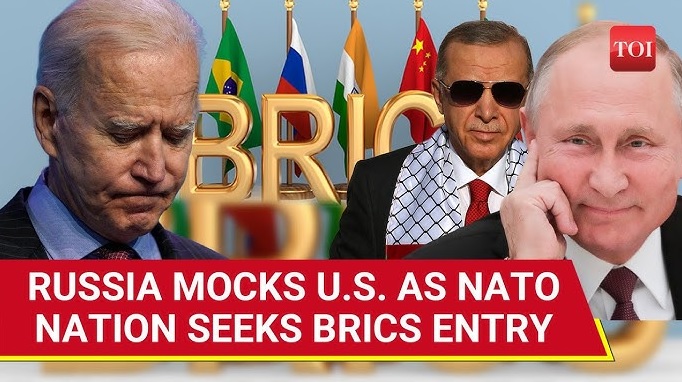
Turkey’s application to join BRICS reflects Erdogan’s dissatisfaction with the West, aiming to strengthen ties with non-Western powers like Russia and China, writes ‘The Jerusalem Post’.
On September 2, Turkey was reported to be the first and only NATO member asking to join the BRICS economic group of nations. BRICS, headed by Russia, China, Iran, and South Africa, is dominated by the Russian and Chinese presidents Vladimir Putin and Xi Jinping.
One former Turkish diplomat told Newsweek that the move by Turkey’s president, Recep Tayyip Erdogan, has been driven by “accumulated frustrations” with the West and the EU. Sinan Ulgen, head of the Istanbul-based think tank EDAM, said: “It’s a strategy to strengthen relations with non-Western powers at a time when the US hegemony is waning.”
Turkey’s application to join BRICS puts it at odds with the rest of the NATO family, but it has been a problematic member from the start. Admitted in 1952, with the Cold War at its iciest, the hope was that Turkey would help protect NATO’s eastern flank from Soviet aggression. Turkey, half-in and half-out of Europe, frequently diverged from the consensus view of the alliance. But since Erdogan came to power – first as Turkey’s prime minister, and later as president – Turkey has consistently pursued tactical and foreign policy goals at odds with the West.
Convinced that Turkey’s place within the organization was impregnable on strategic grounds, Erdogan has persistently pursued his own agenda. For example, in Syria, Turkey is continually challenging the US for supporting Kurdish forces that Erdogan views as terrorists.
Then there was the debacle over Erdogan’s bid to purchase F-35s, the latest generation of US stealth jet fighters, at the same time he was installing Russia’s advanced S-400 air-defense missile system. Defying strenuous American objections and the threat of sanctions, Turkey received the first shipment from Russia in July 2018.
This rendered the American F-35 deal impossible. The S-400 is specifically designed to detect and shoot down stealth fighters like the F-35. If Turkey acquired both, the Russian specialists required to set up the S-400 system would be able to learn about the advanced technology built into the American-made fighter jets.
So when it became perfectly apparent that Erdogan was insistent on receiving the Russian ground-to-air missile system, Washington canceled the F-35 deal.
The effect of Turkey’s S-400 purchase was to enhance Russia’s growing influence in the Middle East. Every subsequent NATO operation had to take into account the presence of the Russian system in Turkey – a disruptive effect on the Western alliance very much to Putin’s liking.
Erdogan’s current dissatisfaction with the West stems from its support for Israel’s response to Hamas’s barbaric attack on Israel on October 7, 2023. Subsequent adverse criticism by many Western nations of the collateral deaths, injuries, and physical damage has done nothing to placate him. His reported response to the exploding pagers and walkie-talkie episodes is to accuse Israel of seeking to expand the Gaza war to Lebanon.
Turkey unlike other NATO members, it has not imposed sanctions on the Kremlin. Rather than annoying Moscow, Erdogan has established himself as a mediator between Russia and Ukraine. He has brokered talks about grain exports from Black Sea ports and the latest prisoner swap between Moscow and Washington.
“Turkey can become a strong, prosperous, prestigious, and effective country,” he said on September 1, “if it improves its relations with the East and the West simultaneously. Any method other than this will not benefit Turkey, but will harm it.”
Warming to his theme, and sticking closely to his precarious, but well-established strategy, he continued: “We do not have to choose between the European Union and the Shanghai Cooperation Organization (SCO) as some people claim. On the contrary, we have to develop our relations with both these and other organizations on a win-win basis.”
Turkey’s application to join BRICS will be discussed at a summit in Russia in October.
read more in our Telegram-channel https://t.me/The_International_Affairs

 9:21 27.09.2024 •
9:21 27.09.2024 •






















